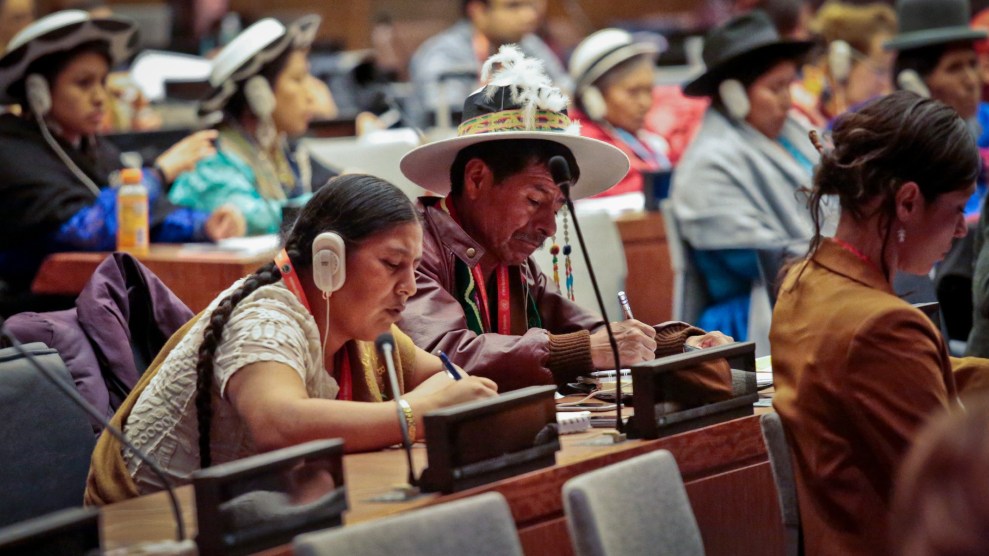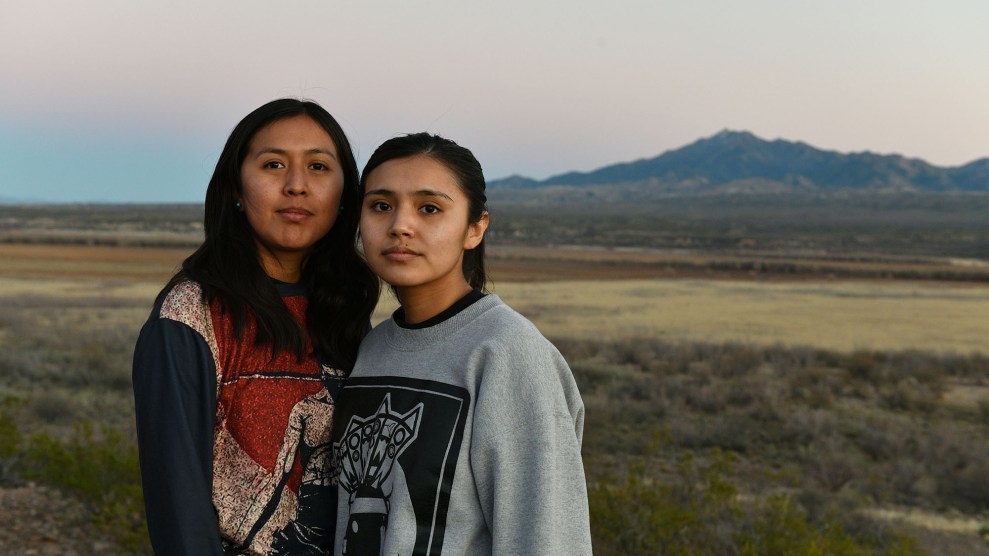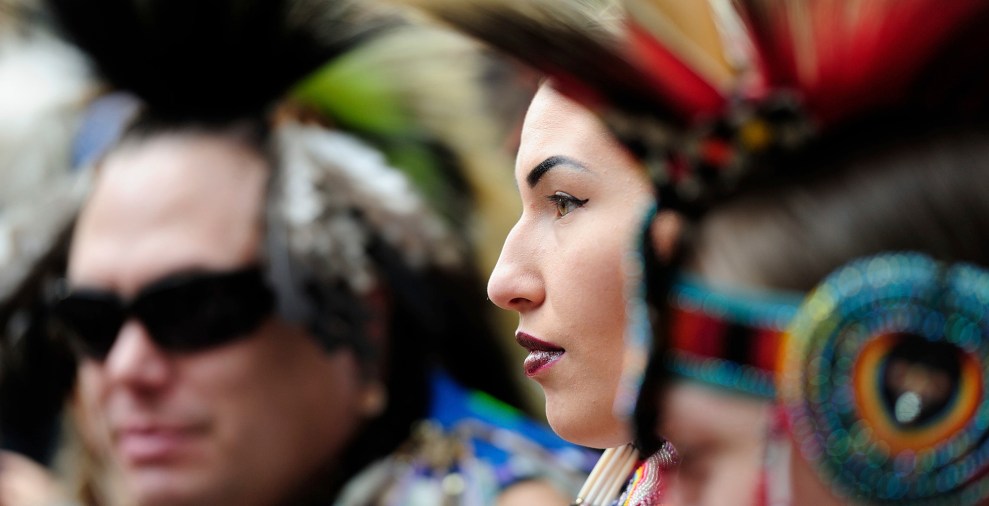
Darnell Sam, a former tribal business councilmember and current traditional territories coordinator for the Confederated Tribes of the Colville Reservation, speaks at the gathering he helped organize at Badger Mountain.Emree Weaver / High Country News
This story was originally published by High Country News and is reproduced here as part of the Climate Desk collaboration.
On a Thursday morning in late March, a group of Wenatchi-P’squosa people and a few dozen supporters assembled amid patches of snow and mud atop Badger Mountain in central Washington. The foggy sagebrush-dotted bluff is among dozens of locations that developers want to use for new renewable energy efforts in the state.
The gathering—the first Indigenous-led demonstration against this proposed development—was intended to highlight threats to cultural resources including food and sacred sites on the mountain. Earlier this year, a ProPublica and HCN investigation found that the state’s process for assessing those resources, which relied on a developer-funded cultural resource survey, had been inadequate. A state archaeologist identified significant shortcomings in the report that was submitted to get the project approved, and the investigation documented bullying behavior by the companies involved.
The proposed solar project is currently in the hands of a governor-appointed group of state officials who will advise him on whether to permit the project. Organizers said they were concerned that the Energy Facility Siting Evaluation Council will move the project forward, despite tribal objections. The Colville Tribes have to work with state agencies like EFSEC on consultation and land surveys as part of the permitting process. The tribal nation, along with other Indigenous nations, has formally issued objections but did not publicly support or organize the demonstration. Still, multiple tribal leaders, including council members, showed up and shared their thoughts.
“The Colville Tribe has opposed this project since we were notified,” said Tribal Business Councilmember Karen Condon, adding that it breaks her heart and that she personally is opposed. If the solar farm goes in, she said, it will destroy their traditional foods and medicine. “Once our areas are destroyed, our ground is destroyed. We’ll never get that back.”
She said the tribal nation should have a greater say over what happens to it. “This is still our land,” said Condon. “We’re sharing it with those that currently occupy the land, but it’s our land.”
“Our people have been coming here since time immemorial to gather our first foods, our medicines,” said organizer Darnell Sam, a former tribal business councilmember and current traditional territories coordinator for the Confederated Tribes of the Colville Reservation. That confederation includes Sam’s people, the Wenatchi-P’squosa. He added that you can’t walk far in any direction without running into a cultural site. “What happens when we come here, and we can’t gather the food? You’re breaking the law. Long before there was any other law, this was the law: that we have to honor the food.”
The development would also impact the Moses Columbia and the federally unrecognized Wanapum people, and at least one of the Confederated Tribes and Bands of the Yakama Nation. The mountain, located near the town of Wenatchee in central Washington, is “a mother. It’s a grandmother. It’s part of our family,” said Sam.
Another attendee talked about protecting everything that lives on the land. “Our brothers and sisters, the deer, the bear, the elk,” said Sophie Nomee, chair of the Wenatchi Advisory Group to the Colville Tribal Business Council. “These are the things that we have to continue to protect.” She cares about the non-Native current owners of the land, too, she said. “We don’t want them to experience what our ancestors went through, when they had to migrate up to the Colville Reservation.”
For one protester, Steven Wynecoop, it’s not just about sovereignty and culinary tradition. The solar development is a health issue. “We can’t keep living off the foods they give us,” said Wynecoop. US government distribution of canned and processed foods on reservations, along with disparities in food access, has been linked to health issues in Native communities. Clarice Paul, a member of the Wanapum Band, said that her community also has cultural ties to the mountain, and that developments on these sacred lands “go against the grain of historical traumatic healing for our people.”
For some, the demonstration was so important that they pulled their kids out of school to be here. “This is my family’s land,” said Mari St. Pierre, who brought her three children from a couple-hours’ drive away to attend. “A year before my grandma passed, she took us up here to dig for roots.” St. Pierre said she wants her children to continue learning about their ancestral lands, a goal supported by their education at Paschal Sherman Indian School, a residential boarding school originally built by colonizers. The Colville Tribes purchased it in the 1970s to perpetuate their own cultural teachings.
One supporter, Sonya Schaller, called Badger Mountain a “rare botanical garden.” Attendees proposed other locations for solar arrays: on fallowed farmlands, corporate rooftops, over parking lots or on lands where a Washington State University mapping project has identified least-conflict zones for solar siting.
EFSEC has recently hired a contract archaeological firm to redo technical work after the original developer-funded survey sparked numerous objections from tribes and state agencies. If EFSEC approves the project, the final authority to permit lies with Gov. Jay Inslee. In 2021, Inslee vetoed language in the Climate Commitment Act that would have protected the Indigenous right to free, prior and informed consent to any development proposed on Indigenous sacred lands.
That Thursday, demonstrators said that they felt unheard by the state in general, and particularly by EFSEC. “They’re not listening to tribes. They’re not listening to the public. And that’s a problem. I do look forward to the day that we set up a protest in Olympia,” said Condon. Organizers say that’s the plan.
On the same day as the demonstration, EFSEC had planned a visit to the other side of Badger Mountain to conduct technical work with an archaeologist from the Colville Tribes. But that visit was rescheduled: “They’re afraid of us,” shouted someone in the crowd, to a ripple of applause and war whoops.
“Public participation is an important part of the EFSEC review for all projects,” said EFSEC spokesman Karl Holappa told HCN in an emailed statement. “We encourage the public to get involved and weigh in through the public comment process.”
Sam said that organizers weren’t thinking about EFSEC when they planned the event, and he emphasized that they’re not just “a bunch of rowdy, wild Indians.”
“It’s been said, and we’re going to say it again: We’re not against green energy. It has its place, but it’s not here on this mountain,” said Sam. “Let it find its place. Let the governor hear that. Let everybody at EFSEC hear that.”
















